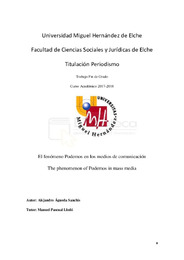Por favor, use este identificador para citar o enlazar este ítem:
https://hdl.handle.net/11000/7077Registro completo de metadatos
| Campo DC | Valor | Lengua/Idioma |
|---|---|---|
| dc.contributor.advisor | Pascual Lledó, Manuel | - |
| dc.contributor.author | Águeda Sanchis, Alejandro | - |
| dc.contributor.other | Departamentos de la UMH::Ciencias Sociales y Humanas | es |
| dc.date.accessioned | 2021-02-05T16:16:46Z | - |
| dc.date.available | 2021-02-05T16:16:46Z | - |
| dc.date.created | 2017-12 | - |
| dc.date.issued | 2021-02-05 | - |
| dc.identifier.uri | http://hdl.handle.net/11000/7077 | - |
| dc.description.abstract | Este TFG pretende analizar, desde un prisma documental, el tratamiento periodístico de los medios de comunicación sobre Podemos, dado por los principales medios de comunicación españoles tanto online y escrito. Podemos es un fenómeno social, cultural y político que en poco tiempo ha logrado transformar los tiempos políticos en España, marcadas hasta el momento por el bipartidismo del PP Y PSOE. Por ello, queremos conocer cómo Podemos es uno de los principales partidos con opciones reales de gobierno. La documentación es un pilar fundamental para conseguir un periodismo de calidad, motivo por el cual la usamos para estudiar el tipo de periodismo que se está practicando con dicha formación política. La confirmación de que el panorama político había cambiado se produjo en noviembre del 2014, cuando el CIS situaba a Podemos como primera opción para formar gobierno. Por eso, y basándonos en el periodismo político y sus consecuencias, hemos realizado una investigación a través de noticias de principales diarios, libros de carácter político para observar el fenómeno de la formación morada. De esta forma, pretendemos comprobar si existen diferencias en el tratamiento informativo y cómo ha repercutido en la evolución de dicho partido. | es |
| dc.description.abstract | This TFG aims to analyze, from a documentary prism, the media treatment of the news media on Podemos, given by the main Spanish media both online and written. We are a social, cultural and political phenomenon that in a short time has managed to transform political times in Spain, marked so far by the bipartisanship of PP and PSOE. Therefore, we want to know how We are one of the main parties with real options of government. Documentation is a fundamental pillar to achieve quality journalism, which is why we use it to study the type of journalism that is being practiced with such political formation. The confirmation that the political landscape had changed occurred in November 2014, when CIS placed Podemos as the first choice to form a government. That is why, based on political journalism and its consequences, we have carried out an investigation through the news of main newspapers, political books to observe the phenomenon of home education. In this way, we intend to verify if there are differences in the information treatment and how it has had an impact on the evolution of this part. | es |
| dc.format | application/pdf | es |
| dc.format.extent | 44 | es |
| dc.language.iso | spa | es |
| dc.rights | info:eu-repo/semantics/openAccess | es |
| dc.subject | Podemos | es |
| dc.subject | communication networks | es |
| dc.subject | redes de comunicación | es |
| dc.subject | periodismo político | es |
| dc.subject | opinión pública | es |
| dc.subject | 15M | es |
| dc.subject | political journalism | es |
| dc.subject | public opinion | es |
| dc.subject.other | CDU::0 - Generalidades.::070 - Periódicos. Prensa. Periodismo. Ciencias de la información | es |
| dc.title | El fenómeno Podemos en los medios de comunicación | es |
| dc.title.alternative | The phenomenon of Podemos in mass media | es |
| dc.type | info:eu-repo/semantics/bachelorThesis | es |

Ver/Abrir:
PER_TFG_ÁGUEDA_SANCHIS_ALEJANDRO (2).pdf
1,12 MB
Adobe PDF
Compartir:
 La licencia se describe como: Atribución-NonComercial-NoDerivada 4.0 Internacional.
La licencia se describe como: Atribución-NonComercial-NoDerivada 4.0 Internacional.
.png)